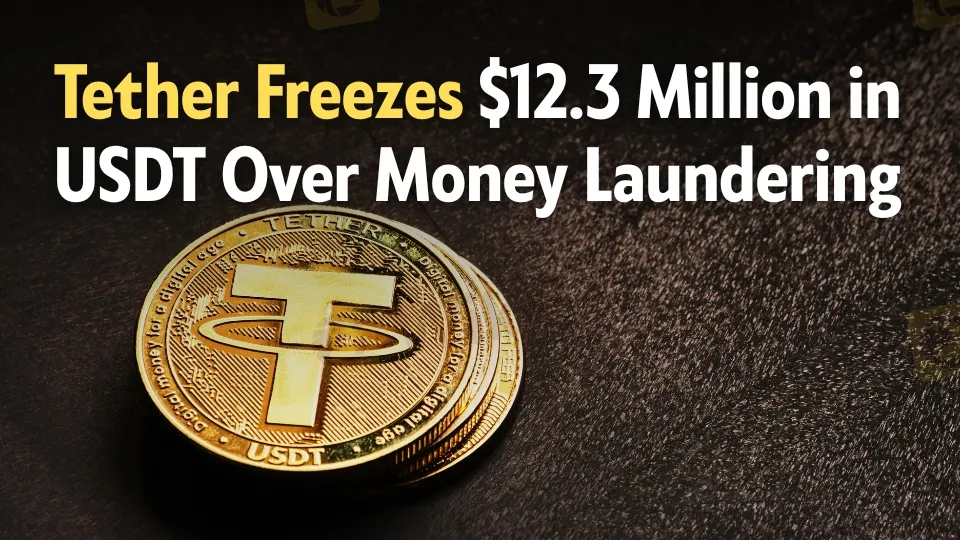简体中文
繁體中文
English
Pусский
日本語
ภาษาไทย
Tiếng Việt
Bahasa Indonesia
Español
हिन्दी
Filippiiniläinen
Français
Deutsch
Português
Türkçe
한국어
العربية
Tether Freezes $12.3 Million in USDT Over Money Laundering Concerns
요약:Tether freezes $12.3 million in USDT on Tron blockchain, reinforcing its anti-money laundering efforts and compliance with U.S. Treasury sanctions.

Tether, a leading stablecoin issuer, has frozen more than $12.3 million in USDT on the Tron blockchain as part of its efforts to prevent suspicious financial transactions. This action, taken at 9:15 am UTC on Sunday, reflects the company's ongoing commitment to meet anti-money laundering (AML) regulations and block transactions linked to sanctioned entities.
Though Tether has not publicly explained the specific reason for this freeze, blockchain data from Tronscan confirms the event. The freeze is likely the result of Tether's stringent compliance protocols, which are aligned with the U.S. Treasurys sanctions list and the Office of Foreign Assets Control (OFAC). These measures aim to prevent the misuse of USDT for illegal activities.

In a March blog post, Tether outlined its wallet-freezing policy, which is designed to prevent its stablecoin from being used in criminal activities. These efforts are part of a larger strategy to combat financial crimes, including money laundering and the financing of terrorism, in compliance with global regulatory standards.
This recent freeze follows an earlier action in March, where Tether blocked $27 million in USDT tied to the Garantex exchange, a platform based in Russia that was sanctioned by OFAC in 2022. Garantex had reportedly failed to comply with AML regulations, prompting U.S. authorities to take action. Despite the sanctions, recent data reveals that Garantex-linked wallets still hold substantial amounts of USDT, including over $15 million as of June 5. This highlights the challenges of curbing illegal activities despite sanctions.
Garantex, which was added to the OFAC sanctions list in April 2022, has been involved in several investigations into money laundering tied to ransomware attacks and darknet markets. The situation was further complicated when two of Garantexs operators, Aleksej Besciokov and Aleksandr Mira Serda, were indicted. Besciokov was apprehended in India and may be extradited to the U.S., while Serda remains at large.

Tether‘s ability to freeze USDT funds has sparked debate within the cryptocurrency community, especially among those who champion decentralization. However, the company’s freezing mechanism has been crucial in assisting law enforcement and blockchain analysis firms in blocking large sums tied to criminal operations. In 2024, Tether, along with the Tron Network and TRM Labs, launched the T3 Financial Crimes Unit, which successfully froze more than $126 million in suspicious USDT transactions within its first six months.
The importance of these efforts is underscored by the persistent threat of North Koreas Lazarus Group, a hacking collective responsible for stealing over $200 million in cryptocurrency between 2020 and 2023. Tether has already blacklisted over $374,000 in USDT linked to the Lazarus Group, and other stablecoin providers have frozen an additional $3.4 million connected to the same hackers.
In conclusion, Tether‘s recent freeze of over $12.3 million in USDT shows the company’s dedication to preventing illegal transactions and adhering to international financial regulations. Ongoing collaboration between Tether, regulatory agencies, and blockchain firms is essential to addressing the ever-evolving risks in the world of financial crime.

면책 성명:
본 기사의 견해는 저자의 개인적 견해일 뿐이며 본 플랫폼은 투자 권고를 하지 않습니다. 본 플랫폼은 기사 내 정보의 정확성, 완전성, 적시성을 보장하지 않으며, 개인의 기사 내 정보에 의한 손실에 대해 책임을 지지 않습니다.
WikiFX 브로커
환율 계산기


